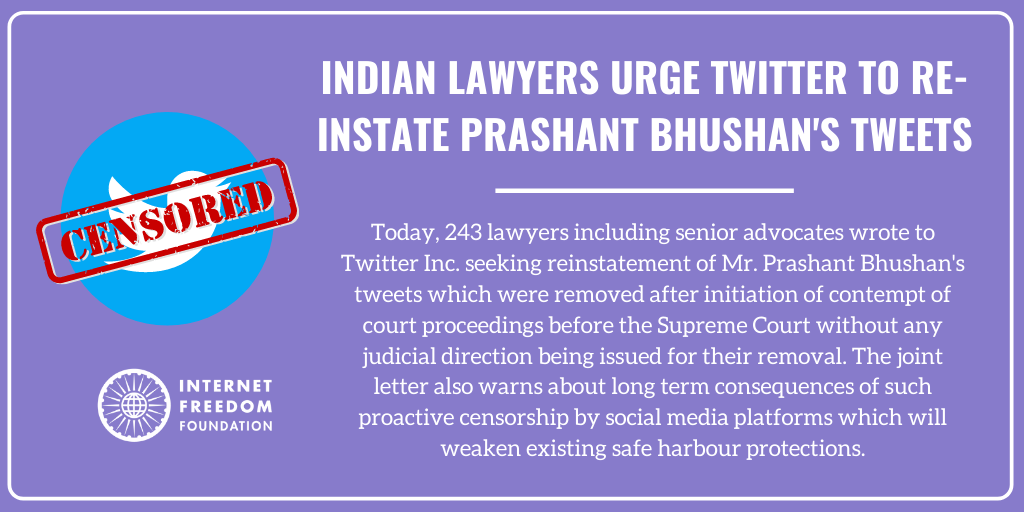
Tl;dr
Today, 243 lawyers including senior advocates wrote to Twitter Inc. regarding its proactive censorship of Mr. Prashant Bhushan, a senior member of the bar committed to anti-corruption and human rights causes. The signatories to the joint representation have urged Twitter to reinstate Mr. Bhushan's tweets since there is no underlying judicial direction for removal of online content and in its absence, such proactive censorship is inconsistent with Twitter’s own content moderation policy, domestic law and international best practices.
Background
Contempt of court proceedings were initiated against Mr. Prashant Bhushan before the Supreme Court of India for posting tweets which criticized the past and present Chief Justices of India. The tweets were disabled by Twitter after the first hearing in the case on 22.07.2020 despite no judicial direction being issued by the Supreme Court for removal of the tweets till date. The webpages for these tweets now state that “This Tweet from @pbhushan1 has been withheld in IN in response to a legal demand.”
While the tweets have been removed from Twitter's platform, their content has been reproduced by the Supreme Court in its orders and by the media in several news reports. As a result, the content of these tweets has become a part of the public record and it is widely available in the public domain. In this situation, it is unclear what purpose will be served by removal of the actual tweets from Twitter's platform except erasure of the historical record.
Standards for Intermediary Liability
We understand and appreciate that companies like Twitter must comply with local laws to continue offering their services in India. However, in the present case, established precedent of the Supreme Court of India in Shreya Singhal v. Union of India shields Twitter from any liability for failing to take down content unless a court order is passed asking it to do the same. In Shreya Singhal, the Supreme Court has clearly held that an intermediary can be found liable for failing to remove content only "upon receiving actual knowledge that a court order has been passed asking it to expeditiously remove or disable access to certain material."
The Manila Principles on Intermediary Liability similarly recognize that online content should not be restricted by intermediaries without an order by a judicial authority. The Manila Principles further clarify that any such court order must (i) provide a determination that the content is unlawful in the jurisdiction; (ii) indicate the Internet identifier and description of the unlawful content; (iii) provide evidence sufficient to document the legal basis of the order; and (iv) if applicable, indicate the time period for which the content should be restricted.
Finally, Twitter's own content moderation policy states that “if we receive a valid and properly scoped request from an authorized entity, it may be necessary to withhold access to certain content in a particular country from time to time.” In the present case, none of these criteria have been satisfied because the tweets were disabled by Twitter Inc. without any direction being issued by the Supreme Court for their removal.
Joint Representation by Indian Lawyers
The joint representation has been endorsed by 243 lawyers practicing in India, and the list of endorsees includes Senior Advocates, Mr. Dushyant Dave, Mr. Sanjay Hegde and Mr. Sanjay Parikh. The representation urges Twitter to reinstate Mr. Bhushan's tweets since there is no underlying judicial direction for removal of content and it warns about the long term consequences of the stance adopted by Twitter in Mr. Bhushan's case.
Such proactive removal of content in the absence of a court order represents a slippery slope, and by making such a concession, Twitter has given authorities precedent to demand censorship of online speech merely based on initiation of court proceedings. Taken to its logical conclusion, this could lead to a scenario where Twitter Inc. is required to disable all content with respect to which a notice or summons has been issued by a judicial authority, concerning underlying claims of infringement or defamation, even if there is no accompanying direction for content removal.
Companies like Twitter Inc. must adopt a consistent and principled stance before courts across different jurisdictions to insist on adherence to rights respecting legal standards available under domestic law, like the Shreya Singal precedent in Mr. Bhushan's case. Otherwise, in the long term, proactive censorship by intermediaries will weaken existing safe harbour protections for platforms and lead to arbitrary and disproportionate censorship of internet users in the developing world.
